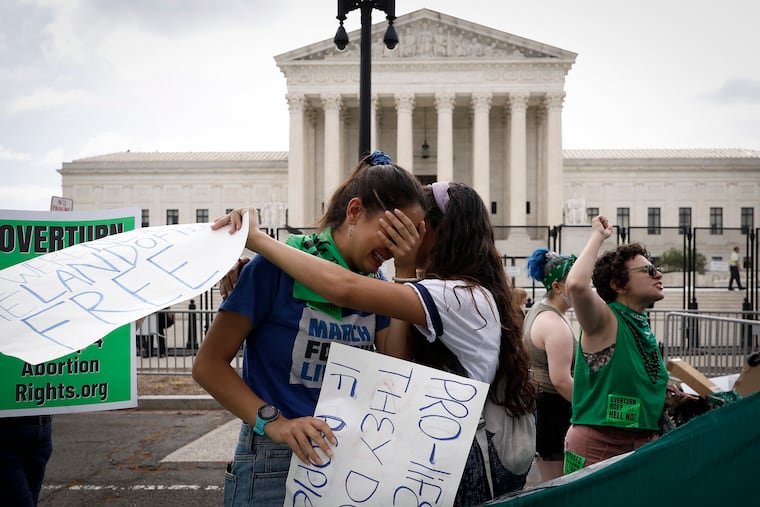Why overturning Roe v. Wade strengthens American democracy
Roe removed the voice of the people from lawmaking — the court’s decision to reverse the ruling has taken steps to restore it.

One of the nation’s most ardently pro-choice Supreme Court justices, Ruth Bader Ginsburg, was a vocal critic of the rationale the court used to decide Roe v. Wade, the landmark 1973 case that provided federal protection for abortion which was overturned last month. She was right. So are the many abortion advocates and liberal legal scholars who have sharply criticized Roe and openly questioned the constitutionality of the ruling.
But Ginsburg has the honor of also being prescient about the devastating impact the Roe decision would have on American political discourse. “A less-encompassing Roe, one that merely struck down the extreme Texas law and went no further on that day might have served to reduce rather than to fuel controversy,” Ginsburg said. She nailed it. A poll by the Pew Research Center on the issue in March shows that Americans are more divided on abortion today than they were 30 years ago.
Ginsburg’s concerns were also practical. Roe, she said, “invited no dialogue with legislators. Instead, it seemed entirely to remove the ball from the legislators’ court.” Roe removed the voice of the people from the process — the court’s decision to reverse the ruling has taken steps to restore it. It’s impossible to think Ginsburg would have struck down Roe if she were on the court today. Ginsburg however rightly knew that the judiciary must be a check on power, not power itself.
» READ MORE: States should set their own abortion laws. This is how a republic works.
Thanks to Roe, abortion became a hyper-partisan issue that allowed a minority of political activists to drive their agenda in the courts. Disempowered and disenfranchised under Roe was everyone else. Most Americans hold more nuanced and shifting views on abortion that Ginsburg and others knew require the robust debate and discernment that the legislative process derives.
We Americans, while pugilistic in our approach, do know when it is time to put a check on power and how to effectively use our democratic process to decide on issues. We can expect abortion to continue to be contentious — but it need not be so for 50 more years. We have proven before that allowing the body politic to drive the issue through the legislative process can help to settle contentious issues of the day.
At the federal level, we passed the 26th Amendment in 1971 that enshrined the voting rights of citizens 18 years of age and older. In Pennsylvania — just last year — we passed a constitutional amendment that limits any governor from unilaterally using their emergency powers for more than 21 days — as Gov. Tom Wolf had done during the COVID-19 pandemic.
Legislatively, we also did it in the civil rights era. Out of the era’s strife came broad acceptance of civil rights laws. They did not end racism or all debate. But the laws brought Americans of color more fully into the promise of the “Declaration of Independence” while making the laws’ main tenets societal norms.
» READ MORE: Once Roe is reversed, Pennsylvanians must elect a governor who will abolish abortion
These same principles can be applied to the abortion debate. Given the complexity and passion around this issue, the divide can seem impossible to bridge. Fittingly, perhaps, it is a Supreme Court justice who recently showed us where to start.
Days before the court’s recent decision, Justice Sonia Sotomayor, one of the courts most reliable progressives, eloquently praised the court’s most reliable conservative, Clarence Thomas. While speaking to progressives disheartened by the pending decision, Sotomayor noted, “you really can’t begin to understand an adversary unless you step away from looking at their views as motivated in bad faith.”
Despite endless headlines to the contrary, most of us desperately want the country to come together. To do so, we need to start acting accordingly. Our new-found voice on the abortion issue is a good place to start. What we can learn from Ginsburg is the fundamental importance of preserving democratic norms when seeking to win on an issue. The Supreme Court rules on the constitutionality of laws — it does not make them.
“The Supreme Court rules on the constitutionality of laws — it does not make them.”
Everyone from Alexis de Tocqueville to great modern figures like Martin Diamond understood this. Self-rule allowed for an active citizenry to vigorously debate and decide how they wanted to live. Not ceding power up to a centralized ruling class on key issues has empowered, not diminished, our ability to be self-governed.
While I most vigorously disagree with many opinions Ginsburg and Sotomayor handed down, all of us should consider following their guidance and example here. If we do, there is a chance for reinvigorated public spiritedness aimed at finding common ground. This may not settle the abortion debate, but it could help heal our nation and strengthen our democracy.
Jennifer Stefano is a fellow at the Independent Women’s Forum.